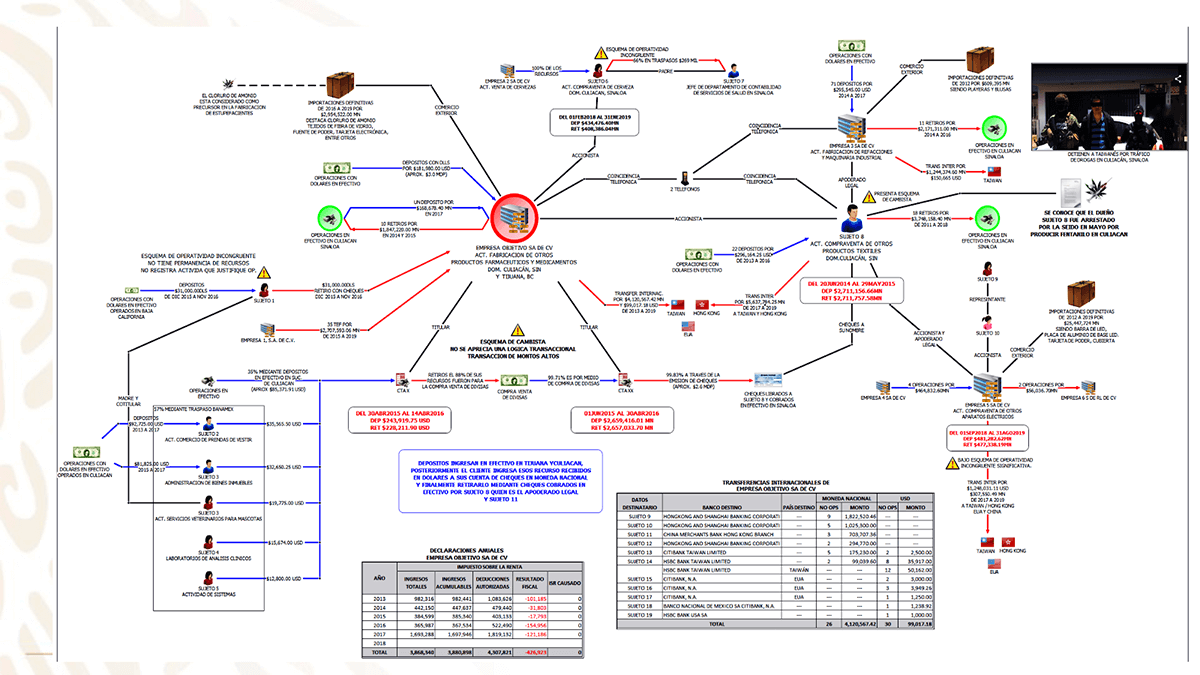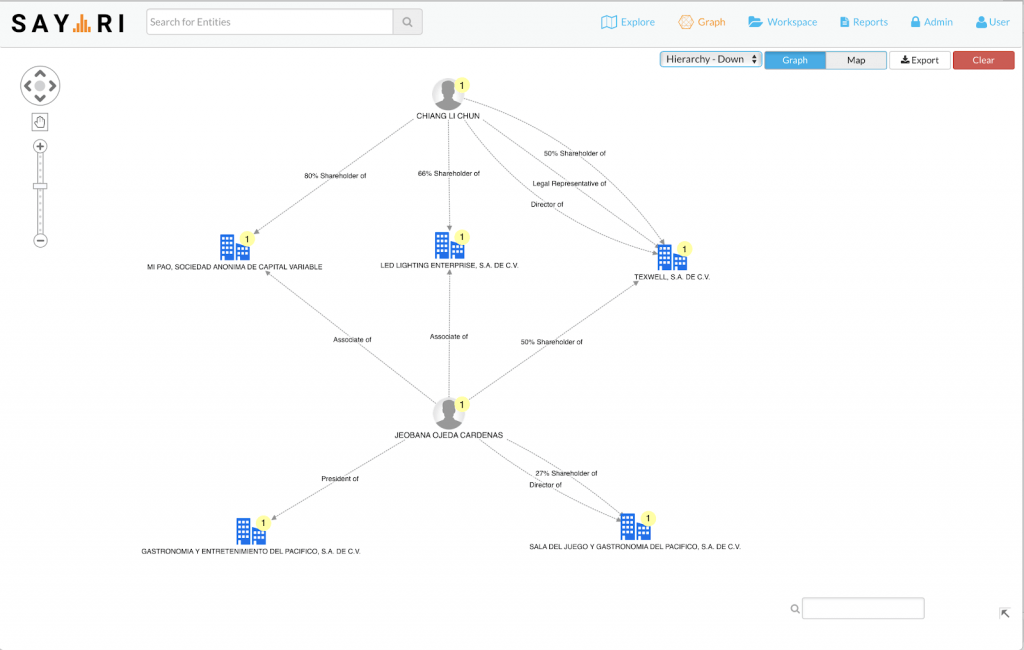A recent investigation by Sayari uncovered a Mexico-based corporate network connected to an individual suspected of supplying the Sinaloa Cartel with illicit fentanyl. Sayari used corporate and trademark records from Mexico to uncover five previously unidentified Mexican companies associated with the suspect and his network.
Sayari also obtained trade data identifying one Chinese company and one Hong Kong company that have shipped known illicit drug precursor chemicals to a company owned by the alleged fentanyl trafficker. The alleged activity of the shipment’s recipient increases the potential that these precursors were used for the production of illicit drugs.
The Arrest of an Alleged Fentanyl Trafficker
On May 9, 2019, Mexican authorities arrested Taiwanese national and naturalized Mexican citizen, Chiang Li Chun (aka Li Chun Chiang) in Culiacan, Sinaloa, for his alleged role in supplying the Sinaloa Cartel with illicit fentanyl. Chiang was involved in procuring fentanyl and precursor chemicals from China and trafficking them through the Port of Manzanillo in the southwestern state of Colima, according to Mexican officials. At the time of his arrest, officials also seized varying amounts of fentanyl, cocaine, methamphetamine, marijuana, and other goods that are believed to be contraband imported from China.
Chiang is also believed to be associated with a clandestine fentanyl lab that Mexican authorities dismantled in April 2019, also located in Culiacan, according to local news reports. During the operation, authorities seized more than 40,000 fentanyl pills along with 14 kilograms of fentanyl powder.
Mexico’s FIU Releases Details Regarding Chiang’s Corporate and Financial Network
In January 2020, Mexico’s Financial Intelligence Unit (FIU) released information about a Culiacan-based, Sinaloa Cartel-linked fentanyl trafficking network that revolves around an unidentified “Target Company,” and unidentified individual “Subject 8,” among several other companies and individuals. The anonymized network graph below details what the Mexican FIU has determined to be “significantly irrational schemes” involving withdrawals, deposits, and international wire transfers using various accounts at HSBC Bank USA, HSBC Bank Taiwan Limited, Citibank, Citibanamex, among several other financial institutions.
The graph also highlights that between 2016 and 2019, the “Target Company” imported close to $150,000 in various commodities including ammonium chloride—a widely used agrochemical that can also be used to extract morphine from opium during heroin production.
While Chiang is not explicitly named in the network graph, officials refer to the unidentified “Subject 8” as a Taiwanese national who was arrested in Culiacan in May 2019 for “producing fentanyl in Culiacan.” Local news outlets have reported that the unidentified “Subject 8” indeed refers to Chiang Li Chun.

Fig. 1: Network Graph from Mexico FIU depicting Chiang Li Chun’s corporate network along with wire transfers to various international financial institutions. Source: Mexico FIU, from contralinea.com.mx
Uncovering Chiang Li Chun’s Corporate Network
- Mi Pao, S.A. de C.V.
- LED Lighting Enterprise, S.A. de C.V.
- Texwell, S.A. de C.V.
All three entities could be some of the unidentified companies presented in the FIU network graph. Given Chiang’s alleged role as a fentanyl trafficker, any one of these companies could potentially be used to import fentanyl and/or precursor chemicals, as well as launder the proceeds of any illicit activity.
Chiang appears on all three companies with an individual identified as Jeobana Ojeda Cardenas. On two of the companies, Jeobana Ojeda serves as a legal representative for what appears to be Chiang’s daughter, who is a minor. Chiang’s daughter is a co-shareholder of LED Lighting Enterprise and Mi Pao. Sayari also identified Jeobana Ojeda as a 27 percent shareholder of Sala del Juego y Gastronomia del Pacifico, S.A. de C.V., and the president of the board of directors of Gastronomia y Entretenimiento del Pacifico, S.A. de C.V., both of which are registered in Culiacan.
The stated business purpose of the two companies is similar, with one purportedly engaging in “activities and events related to betting/gambling games,” and the other “providing administrative services for operators of games and drawings,” according to corporate documents obtained from the Sinaloa State Corporate Registry. The stated business purpose of these two companies is significant in that casinos, slot machines, and other forms of gambling games are widely used by Mexican criminal organizations to launder the proceeds of drug trafficking and other illicit activities.

Fig. 2: Sayari network graph depicting the corporate assets associated with Chiang Li Chun and his business associate, Jeobana Ojeda Cardenas.
Chiang Li Chun’s Imports from China
Mexico import data obtained by Sayari show that Mi Pao has imported several shipments of ammonium chloride from China, the same chemical that Mexican officials say was imported by the “Target Company” in the fentanyl network. In fact, between August 8 and December 28, 2018, Mi Pao, S.A. de C.V. imported 40,000 kg of ammonium chloride in five separate shipments from Chuen Yick Industrial Ltd, a Hong Kong-based company. Thus, Chiang’s direct connection to Mi Pao coupled with Mi Pao’s importation of the same chemical imported by the “Target Company” in the FIU fentanyl network graph, strongly suggests that Mi Pao could be the unidentified “Target Company” being investigated by the Mexican authorities.
What’s more, on December 28, 2018, Mi Pao, S.A. de C.V. imported 1,250 liters of b-bromoethyl benzene from Yancheng Longshen Chemical Co., Ltd., a China-based chemical company. B-bromoethyl benzene likely refers to beta-bromoethyl benzene, which is another name for 2-bromoethyl benzene—a key precursor chemical used to synthesize fentanyl and fentanyl analogues.
While both of these chemicals have legitimate uses in the pharmaceutical and agricultural industries, given that Mi Pao is majority-owned by an alleged fentanyl trafficker, it is possible that at least some of these chemicals were diverted to manufacture illicit drugs.
Fentanyl Trafficking Leading to Increased Risk in the Mexican Chemical Industry
The case of Chiang Li Chun—along with other cases of seized clandestine fentanyl labs—suggest that Mexico’s chemical industry is becoming increasingly vulnerable to abuse by drug traffickers. Chemical companies doing business in Mexico must take this into account to ensure that their products are not being diverted for illicit purposes. Sayari Graph can play a key role in mitigating this risk.